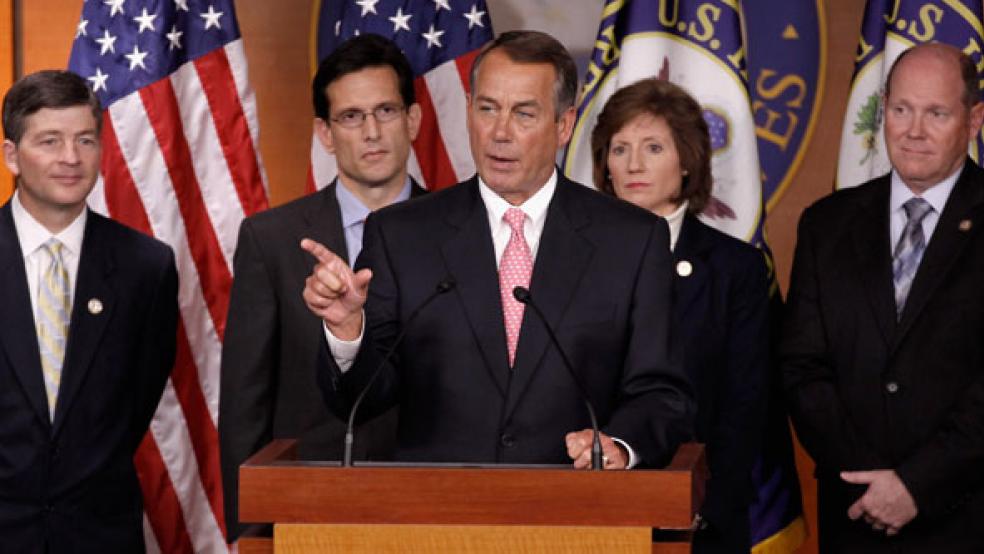One of the many mistakes House Republican leaders made this week in trying to push through their version of a plan to end the government shutdown and avert a default on U.S. debt was adding an obscure amendment that essentially would increase the cost of health care for lawmakers as well as their own staff members and executive branch employees.
The proposal was a morale killer for congressional and executive staffers and invited a veto threat from the White House.
Under the Affordable Care Act, many on Capitol Hill and in the executive branch are required to give up their government-subsidized health insurance policies and purchase replacement policies in the new Obamacare insurance exchanges. The Vitter Amendment would eliminate federal subsidies for these employees, forcing them to pay the full cost of premiums out of their own pocket.
RELATED: GOP RISKS 5-WAY FAILURE OVER DEFUNDING OBAMACARE
House Speaker John Boehner (R-OH) and scores of other GOP leaders and members insisted it was only “fair” that government workers lose the federal subsidy and take their chances on finding affordable insurance through Obamacare.
But the subsidized insurance that federal and congressional workers currently receive is no different from the insurance that many private employers provide to their workers. And government workers denied the opportunity to retain that subsidy in purchasing new policies on the exchanges would suffer a pay cut of as much as $5,000 for singles and $12,000 for family coverage. The reduction in benefits would affect some 16,000 congressional staff.
Many GOP leaders viewed the amendment as their last chance to take a swing at Obamacare, after repeatedly failing in attempts to postpone or defund the program.
Opponents said it would disproportionately affect low-level staffers who, without the subsidies, would be forced to pay for their health care premiums out of their own pocket.
One GOP staffer told Mother Jones that by implementing the amendment "Congress literally threw staff under the bus….You're hurting staff assistants who are sorting your mail."
The provision in Obamacare forcing members of Congress and their staffs onto the exchanges was first proposed by Sen. Chuck Grassley (R-IA) in 2010 as a “poison pill” measure to try to thwart passage of the law. But that backfired when Democrats happily accepted the measure, since they didn’t view being “forced” onto the exchanges created under the law they championed as a punishment.
Under current law, the Office of Personnel Management pays part of congressional employees’ health care premiums on the new exchanges, similar to how an employer would contribute to an employee’s health care in the private sector. But the subsequent amendment by Sen. David Vitter (R-LA) would have eliminated the subsidy, forcing employees to pay for their entire premium.
RELATED: UNINSURED FACE CUTS IN OBAMACARE SUBSIDIES
It was the Vitter amendment seized on by House GOP leaders as a shining example of “fairness” in the implementation of Obamacare. But that was little solace for government staffers who already were struggling to get along on meager salaries.
Early Tuesday, Boehner sought to put down a small rebellion by watering down the Vitter amendment to exempt staff members from the cut, and only eliminate subsidies for lawmakers, cabinet members and the president and vice president. But the GOP’s far right wing said there shouldn’t be any exceptions, according to the National Review’s Robert Costa.
The full amendment was added back into the GOP bill, but some speculate Boehner added it back in only to appease the far right.
“The fact that Boehner doesn't want Vitter amendment to become law is pretty good sign that new House bill is gesture to placate hard-liners,” CNBC’s John Harwood tweeted.
Soon after word spread that the full Vitter amendment would be part of the bill, it began losing support from members of both parties. By Tuesday afternoon, House leadership reported that it didn’t have the votes needed to bring it to the floor.
“I’ve been a staffer in a Republican Senate office for more than 8 years…My healthcare costs are already going to skyrocket, but being responsible for 100 percent of my premiums just isn’t realistic on my salary,” one anonymous congressional staff member told The New Yorkers’ Ryan Lizza. “I know I’m not the only staffer looking for a job off the hill because I knew this was a possibility.”





